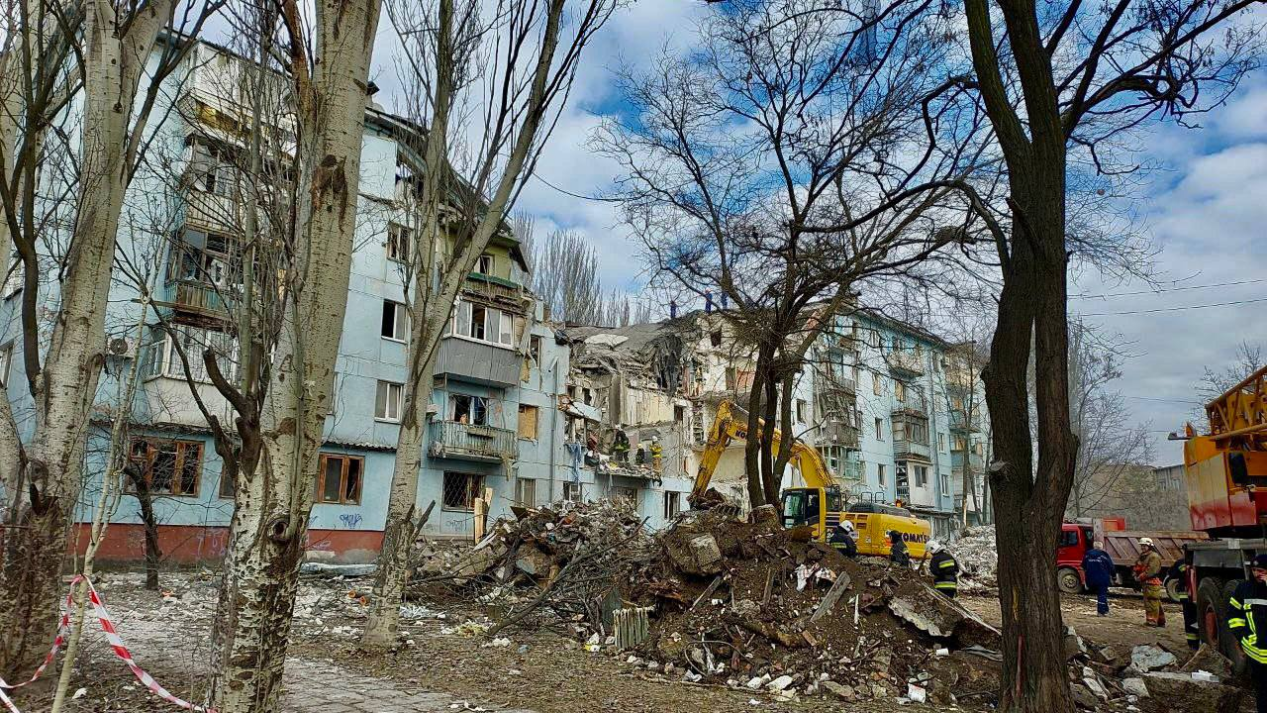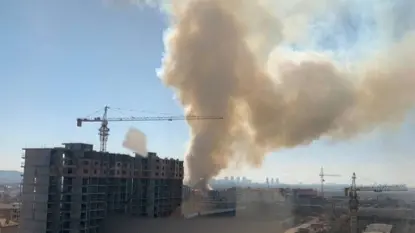Explosions lit up the night sky on Friday morning deep inside Russia near a town which is host for a high security Kremlin weapons research facility, as President Volodymyr Zelensky hinted that Kyiv’s campaign of long-range strikes against Moscow's forces will continue and multiply in the future.
Russian national news agencies and local social media reported that two blasts shook the vicinity of Kolomna, home to the state-owned missile and aerospace research institute “Design Bureau of Machine Building (DBMB)”, about an hour’s drive from the Russian capital.
JOIN US ON TELEGRAM
Follow our coverage of the war on the @Kyivpost_official.
Eyewitnesses posted accounts of a whistling sound followed by explosions powerful enough to shake windows. Security officials set up road checkpoints and cordons around the area where at least one “air explosion” took place, the state-run TASS news agency reported. The state-run television channel Zvezda reported an explosion took place “in a rural area”.
Among other advanced Kremlin weapons, DBMB is the lead state agency for designing and upgrading Russia’s Kinzhal hypersonic missile, a weapon the Kremlin has claimed is superior to anything NATO possesses. The research center is some 75 km south-east of Moscow and at least 500 km from the closest likely Ukrainian drone launch site.
Russian and Ukrainian social media were quick to declare Ukrainian long-range drones responsible for the Kolomna blasts, but Russian official sources by midday Friday had made no direct comment. TASS reported a search for “aircraft debris” was continuing.

Luxury Western Goods Line Russian Stores, Three Years Into Sanctions
On Friday in Russia’s southern Krasnodar region, local media widely reported a massive fire in the vicinity of a military base. Video showed a gray-white smoke column reaching hundreds of meters into the sky, and some posters claimed they had heard explosions. Emergency response officials dismissed it as “a grass fire”.
In a nationally-televised speech the previous evening, Zelensky praised Ukrainian soldiers and civilian rescue workers for bravery during Russian missile strikes on Ukraine and vowed vengeance that would reach Russia.
“The enemy will feel our response for the barbaric attack on Zaporizhia, both legally and militarily. The occupier will inevitably feel our strength. The strength of justice in all senses of the word” Zelensky said in his Thursday evening address.
 Ukrainian apartment building following a nighttime strike by a Russian S-300 missile in the southern city Zaporizhia on Mar. 1. President Zelensky in a Mar. 2 nationally-televised speech said Ukraine will retaliate. Source: Zaporizhia Regional Defense Command.
Ukrainian apartment building following a nighttime strike by a Russian S-300 missile in the southern city Zaporizhia on Mar. 1. President Zelensky in a Mar. 2 nationally-televised speech said Ukraine will retaliate. Source: Zaporizhia Regional Defense Command.
On Thursday morning a Russian S-300 missile or missiles had struck an apartment building in the southern Ukrainian city of Zaporizhia, devastating upper floors of the five-story building and burying residents in rubble. By Friday morning Anatoliy Kurtiev, a Zaporizhia city spokesman, stated that rescue workers had uncovered five bodies, treated eight survivors and were still searching for ten missing persons missing.
Russia’s Defense Ministry on Thursday said Ukraine had launched as many as six mid-range kamikaze drones at the Saksky military airfield, in Russian-occupied Crimea. The Kremlin claimed local air defenses shot down two Murgin-5 Chinese and Russian personnel and equipment were unharmed. Independent news agency “Baza” said that one drone had struck an airfield building and exploded and the second crashed in a field.
A suspected Ukrainian long-range drone had penetrated Russian air space around the city St. Petersburg on Monday which triggered air raid warnings and forced the grounding of dozens of civilian flights. It eventually crashed near a gas condensation plant south-east of Moscow after flying as much as 1,000 km in Russian air space.
Recent long-range strikes by a Ukrainian weapons system of an unidentified type have damaged a Russian airfield in the city of Eisk close to the Azov Sea. The attack forced the evacuation of at least six Su-34 strike jets based there and satellite imagery published by Ukrainian Schemy news on March 1 showed burning ground facilities. Eisk is some 150 km from the closest probable Ukrainian drone launch sites. The long-range weapon most commonly-used by the Ukrainian military are rocket sfired by the US-made HIMARS and M270 artillery systems, with a maximum range of 80 km.
In statement on state-controlled television on Thursday Viktor Sobolev, a member of the Duma Defense Committee, said the Ukrainian strikes on Russian territory are grounds for all-out war: “ We don't have any red lines left with regard to Ukraine. And we definitely need…the destruction of means and facilities of communications, with the elimination of (Western) arms deliveries. This should have been done a long time ago."
Kyiv officials report that, since it invaded Ukraine in February 2022, Russia has fired more than 5,000 heavy missiles against primarily civilian targets. The Russian President announced a missile bombardment campaign to destroy Ukraine’s power grid and force the Ukrainian population to sue for peace in October 2022.
By March 2023 it was a clear those operations had largely failed and that Russian missile supplies running short. Thanks to the efforts of Ukrainian engineers, Ukraine’s power grid was delivering steady electricity supplies and western-supplied Ukrainian air defenses had knocked down over 70% of incoming Russian missiles. However, the Kremlin bombardment, which is still ongoing, albeit with dwindling stocks of cruise missiles and Iranian light drones, has caused billions of dollars of property damage and killed hundreds of civilians according to Ukrainian official calculations.
You can also highlight the text and press Ctrl + Enter






